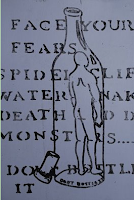Why the necessity of taking both an initial and a continuing moral inventory? Principally, it is because we manufacture our own troubles and problems. "They arise out of ourselves, and the alcoholic is an extreme example of self-will run riot, though he usually doesn't think so." Indeed, the troubles and problems of most individuals - alcoholic addicts and so-called "normal" people alike - are mostly self-manufactured.
"(T)he aspirant who is really earnest about the (spiritual) quest," observes Brunton, "should develop the attitude that his personal misfortunes, troubles and disappointments must be traced back to his own weaknesses, defects, faults, deficiencies and indisciplines. Let him not blame them on other persons or on fate. In this way he will make the quickest progress whereas by self-defending, or self-justifying, or self-pitying apportionment of blame to causes outside himself, he will delay or prevent it. For the one means clinging to the ego, the other means giving it up. Nothing is to be gained by such flattering self-deception while much may be lost by it." (Emphasis added.)
"It is a man's own internal defects which often contrive against him and which show their faces in many of the external troubles that beset him," observes philosopher and spiritual sage, Paul Brunton. "Yet it is hard for him to accept this truth because his whole life-habit is to look outwards to construct defensive alibis rather than to engage in censorious self-inquisition."Does this sound familiar?
[Brunton, "The Notebooks of Paul Brunton," Vol. 1, p. 137.]
"(T)he aspirant who is really earnest about the (spiritual) quest," observes Brunton, "should develop the attitude that his personal misfortunes, troubles and disappointments must be traced back to his own weaknesses, defects, faults, deficiencies and indisciplines. Let him not blame them on other persons or on fate. In this way he will make the quickest progress whereas by self-defending, or self-justifying, or self-pitying apportionment of blame to causes outside himself, he will delay or prevent it. For the one means clinging to the ego, the other means giving it up. Nothing is to be gained by such flattering self-deception while much may be lost by it." (Emphasis added.)
"Selfishness - self-centeredness! That we think is the root of our troubles. Driven by a hundred forms of fear, self-delusion, self-seeking, and self-pity, we step on the toes of our fellows and they retaliate. Sometimes they hurt us, seemingly without provocation, but we invariably find that at some time in the past we have made decisions based on self which later place us in a position to be hurt."Even for the non-alcoholic to make significant spiritual progress, he or she must first practice a rigorous self-survey, according to Brunton, not seeking to blame others, but instead facing how his or her troubles originate in the egoic, self and its distorted perceptions of the world and other people.
[Alcoholics Anonymous, page 62.]
"He must bring himself to admit frankly that he himself is the primary cause of most of his ills, as well as the secondary cause of some of the ills of others. He must recognize that the emotions of resentment, anger, self-pity, or despondency are often engendered by a wounded ego. Instead of reviling fate at each unfortunate event, he should ananlyse his moral and mental make-up and look for the weaknesses which led to it. He will gain more in the end by mercilessly accusing his own stubbornness in pursuing wrong courses than by taking shelter in alibis that censure other people. Like a stone in a shoe which he stubbornly refuses to remove, the fault still remains in his character when he stubbornly insists on blaming things or condemning people for it. In this event, the chance to eliminate it is lost, and the same dire consequences may repeat themselves in his life again.For those who have done multiple Fourth Step and Tenth Step inventories, and particularly for those who have been on the receiving end of another alcoholic addict sharing his or her Fifth Step, it soon becomes clear just how universal and impersonal the human ego is. Indeed, it can rightly be portrayed as a "false self" - an attitude and identity that is manufactured and/or adopted rather than developed organically. It is only by painful yet accurate self-survey that we may confront and overcome both the supposed "realities" the ego presents to us, and the power its distorted way of "seeing" things holds over us.
[Brunton, supra.]
"The faith of the lower ego in itself and the strength with which it clings to its own standpoint are almost terrifying to contemplate," Brunton observes. "The (spiritual) aspirant is often unconscious of its selfishness. But if he can desert its standpoint, he shall see that his miserable fate derives largely from his own miserable faults. He is naturally unwilling (at first) to open his eyes to his own deficiencies and faults, his little weaknesses and large maladjustments. So suffering comes to open his eyes for him, to shock and shame him into belated awareness and eventual amendment."Remember! "At some of these we balked. We thought we could find an easier, softer way. But we could not. With all the earnestness at our command, we beg of you to be fearless and thorough from the very start. Some of us have tried to hold onto our old ideas and the result was nil until we let go absolutely."
"But quite apart from its unfortunate results in personal fortunes, whenever the aspirant persists in taking the lower ego's side," Brunton notes, "he merely displays a stubborn resolve to hinder his own spiritual development. Behind a self-deceiving facade of pretexts, excuses, alibis and rationalizations, the ego is forever seeking to gratify its unworthy feelings or to defend them. . . . The aspirant must choose between denying his ego's aggressiveness or asserting it. The distance to be mentally travelled between these two steps is so long and so painful that it is understandable why few will ever finish it. It is only the exceptional student who will frankly admit his faults and earnestly work to correct them. It is only he whose self-criticizing detachment can gain the upper hand, who can also gain philosophy's highest prize."
[Brunton, supra.]
[Alcoholics Anonymous, p. 58.]
Thus, despite the oft-time bitter and painful nature of radical self-survey, those who persist in taking a fearless and thorough moral inventory are those who overcome the egoic self, and those for whom the full promises of Alcoholics Anonymous become a reality. Beyond the ego, lies true emotional sobriety.









































